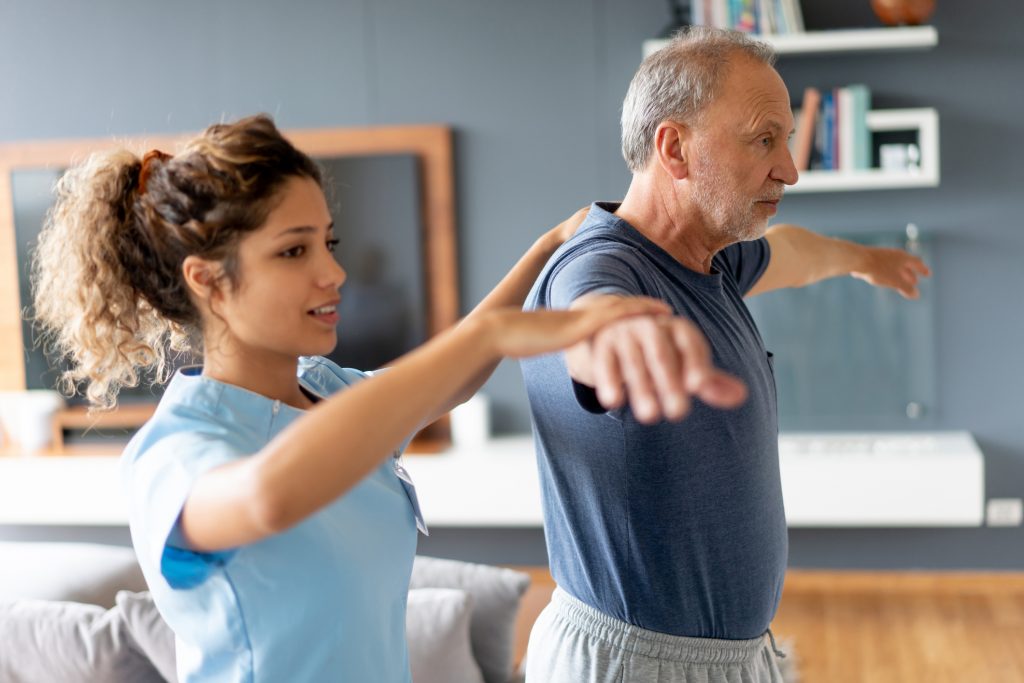Declines in feelings of energy can lead to balance problems in older adults, according to Clarkson University research published this spring in the journal Physical & Occupational Therapy in Geriatrics.

“We wanted to see whether increases in feelings of fatigue or, alternatively, reductions in feelings of energy led to declines in balance or gait,” says lead researcher Associate Professor of Physical Therapy Ali Boolani. “We found that declines in feelings of energy led to declines in balance — some declines in balance clinically meaningful.”
Three years ago, an undergraduate researcher in Boolani’s lab, biology major Stephanie Grobe ’17, published a theoretical paper that stated when older adults feel mentally fatigued, they are more likely to have changes in balance and gait, which can lead to increased fall risks. Several researchers tested the theory and found no change in balance and gait with mental fatigue, unless the subject was performing two tasks at once.
This was perplexing to Boolani’s team, but their lab had subsequently found that feelings of energy and feelings fatigue were actually two very different moods. When Grobe had written the paper, they were examining energy and fatigue as opposite ends of the same continuum — i.e. if you’re not fatigued, then you’re energetic; or if you’re not energetic, then you’re fatigued.
However, several new studies in the lab showed that one could be both energetic and fatigued at the same time and that even biological responses to the two moods were very different.
“That is why we set out to study whether it was a decline in feelings of mental energy or increases in mental fatigue that could potentially cause changes in balance and gait,” says Boolani.
The laboratory of Clarkson Associate Professors of Computer Science Natasha and Sean Banerjee performed a pilot study, which found that declines in feelings of energy lead to significant decreases in balance. After performing only one hour of mental work, these older adults reported a decline in feelings of mental energy, which then led to changes in balance. This primarily occurred when their eyes were closed or their vision was obstructed.
The Banerjee lab confirmed that what the researchers were “seeing” was true by using video of the subjects performing tasks and machine-learning models created by computer science undergraduate student Jenna Ryan ’21. They were able to identify when there was a decline in feelings of energy with 79 percent accuracy.
“Jenna and the Banerjee lab were instrumental in helping us identify which aspect of the Berg Balance Test had the greatest change in balance after the decline in mental energy,” says Boolani.
He adds that this is the first study of its kind, since most researchers have not tried to distinguish between the feeling of energy and the feeling of fatigue.
Boolani is currently submitting a grant to the National Institutes of Health in which his team will use the Xbox Kinect to give older adults an at-home exercise intervention to improve their mental health during the COVID-19 pandemic. The researchers plan to use machine-learning models to modify the workouts in real time if they note an increase in fall risk or negative changes in mood.
The authors of the journal article are Boolani, Ryan, Physician Assistant Studies alumna Trang Vo ’18, Physician Assistant Studies alumnus Brandon Wong ‘18, Natasha Banerjee, Sean Banerjee, former Associate Dean of Health Sciences George Fulk, Texas A&M University Prof. Matthew Lee Smith and former Physical Therapy Prof. Rebecca Martin.
Click here for a shareable link: https://www.clarkson.edu/news/clarkson-university-researchers-find-low-energy-can-lead-falls-older-adults
